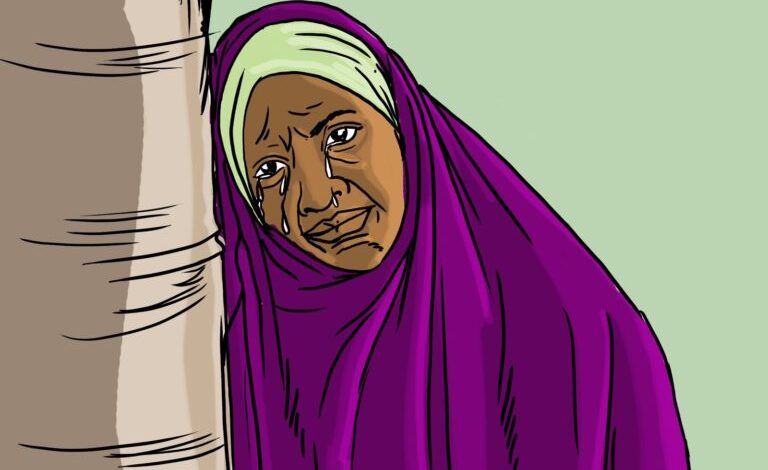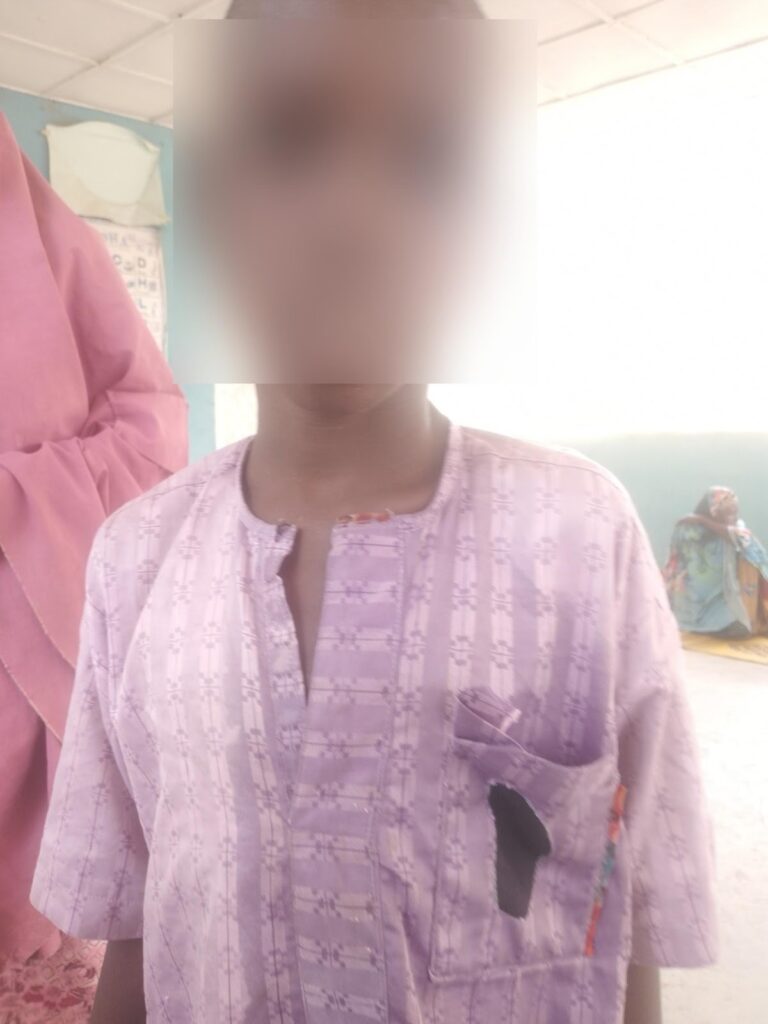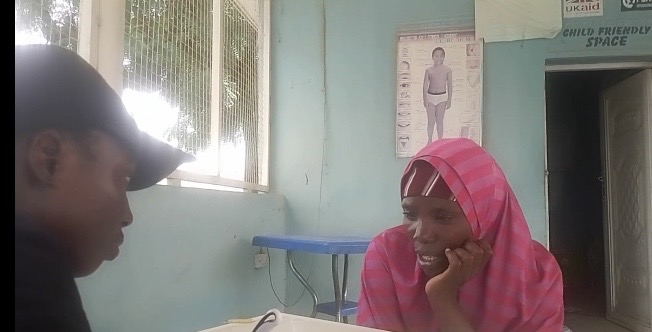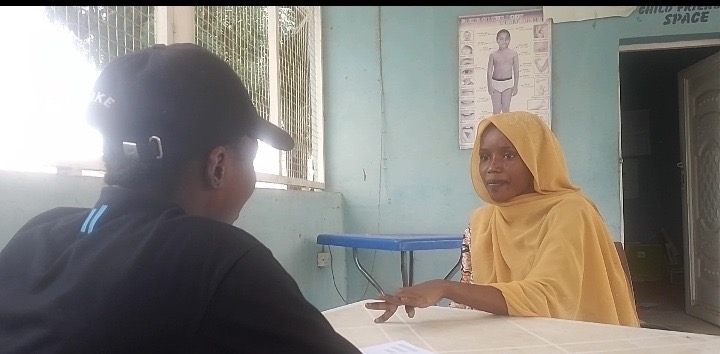Life Post-Abduction For Three Women In Northeastern Nigeria
After a daring escape from the clutches of this terror group, three women who endured years of trauma at the hands of the insurgents have shared their stories of tragedy, resilience, and hope.

In the town of Madagali, a Local Government Area of Adamawa, North East Nigeria, where Boko Haram’s insurgency once held sway, three women carry the scars of captivity, loss, and the enduring struggle for survival.
While the frequency of insurgent attacks in Madagali is waning, the trauma endured by its residents persists. Three women — Dudu Hamma, Zainabu Yakubu and Amina Bamanga — told HumAngle the stories of how their lives have been altered since the terrorists invaded their communities and captured them after killing their loved ones.
Like these three, many women in Madagali have lost their husbands, children, and livelihoods. They now face the harsh choice of becoming refugees in a foreign community or remaining displaced within the familiar but devastated surroundings of their hometown.
Dudu is from Humshi, a community in Madagali. Her life was forever altered on the day Boko Haram insurgents overran their village. In a desperate attempt to escape the marauding fighters, Dudu and her family fled towards the Cameroonian border, but the freedom they longed for eluded them.
“My husband was killed when we were trying to escape to Cameroon after they invaded our town,” she narrated. “I was nine months pregnant then, and they took us to a town called Bebel.” She was captured alongside her seven children and other relatives. “They locked us up in one room and only fed us tuwon masara and kuka soup that didn’t have salt or Maggi [seasoning].”
Dudu gave birth to a stillborn child at Bebel, alone and without support. Yet her ordeal was far from over. As the Nigerian military approached the camp where she was held, the insurgents transferred her and other captives to Sambisa forest. For her, it was like escaping the frying pan only to fall into the fire.
She was forced into servitude under the wife of a senior Boko Haram commander after refusing to be married off to any of the group’s members. But another tragedy soon struck—her seven-year-old son was forcibly taken away from her.
For seven agonising months, Dudu didn’t know the whereabouts of her child. Upon their eventual reunion, she noticed that her son had developed psychological problems.
“When he was returned to me, I noticed he exhibited strange behaviours. He was behaving like someone scared, and he [was] also acting like a mentally unstable person,” Dudu said. Her son’s condition has only worsened, as he now suffers from debilitating nightmares that leave him screaming in his sleep.

A few weeks after her son’s return, Dudu, some women, and their children devised a daring escape plan, which they put into action while searching for vegetables in the bush. However, as they fled, the insurgents discovered them and gave chase. Fortunately, they were rescued by members of the Nigerian Army who were raiding the forest at the time.
Dudu is desperately seeking help, but with limited access to mental healthcare and no one to support her, her efforts have yet to improve life for her and her son. As she faces ongoing struggles, Dudu is also seeking financial assistance to feed her family and medical care for her son, who continues to suffer from trauma-induced psychological problems.

For Zainabu Yakubu, when Boko Haram invaded Madagali in 2014, she decided not to flee. Her defiance was met with brutal consequences as she was captured and forced into marriage with a Boko Haram fighter in the Sambisa Forest. However, after nine years, like Dudu, she devised an escape plan alongside other captives.
“We tried to escape from the Sambisa Forest around 11 a.m., but because we were not familiar with the road. We got lost and kept going in circles, wandering until evening. We were eventually recaptured and taken back to the forest,” she recounted.

Zainabu endured a gruelling nine years in captivity following the failed escape until the Nigerian Army rescued her alongside her daughter, who a Boko Haram member fathered. The child now faces a life marked by stigma due to her parentage.
“Maryam Bana, my daughter, is currently stigmatised and marginalised in school and among her peers. They always make fun of her by calling her ‘Boko Haram’s daughter.’ This has caused her to stop playing with other children and to isolate herself,” she said.
Despite the odds, Zainabu is surviving on the fumes of hope. She sells groceries while labouring to raise her daughter.
Raised in insurgency

Unlike the other women, Amina was a mere child when Boko Haram shattered her family. At six, she was abducted alongside her mother and siblings. Her mother was forced into marriage, while her elder sister and brother were taken to different locations, and her sister also became a victim of forced marriage to a terrorist.
A year ago, at 16, Amina, her mother, and other siblings were eventually rescued, but her elder sister and brother were left behind because their whereabouts were unknown.
Amina endured a decade of captivity in the Sambisa forest.
“My father had properties before the insurgency. He owned many houses and farmland. He was devastated when we were captured, so he sold almost everything and gave the money to spiritual diviners to find a way for us to come back home,” she said.
Now, she and her family have nothing left. “The only farmland remaining cannot be cultivated because it is not safe to go there. We are left with nothing.”
Life has not been the same for her and her family, even after being reunited with their father, as they now struggle to survive.
Amina pleads with other survivors for inclusivity in humanitarian aid and government support. Some community leaders often deny them access to help. “Efforts should be made to support the marginalised and ensure that no one is left behind.”
As of mid-2024, over 2.3 million internally displaced persons (IDPs) in Nigeria due to conflict and violence, according to the Internal Displacement Monitoring Centre (IDMC).
The psychological toll of displacement is severe, with studies indicating that 50 per cent of displaced individuals suffer from anxiety and depression, significantly affecting their quality of life and overall well-being.
* This story was produced under the 2024 HumAngle Accountability Fellowship.
Support Our Journalism
There are millions of ordinary people affected by conflict in Africa whose stories are missing in the mainstream media. HumAngle is determined to tell those challenging and under-reported stories, hoping that the people impacted by these conflicts will find the safety and security they deserve.
To ensure that we continue to provide public service coverage, we have a small favour to ask you. We want you to be part of our journalistic endeavour by contributing a token to us.
Your donation will further promote a robust, free, and independent media.
Donate HereStay Closer To The Stories That Matter




